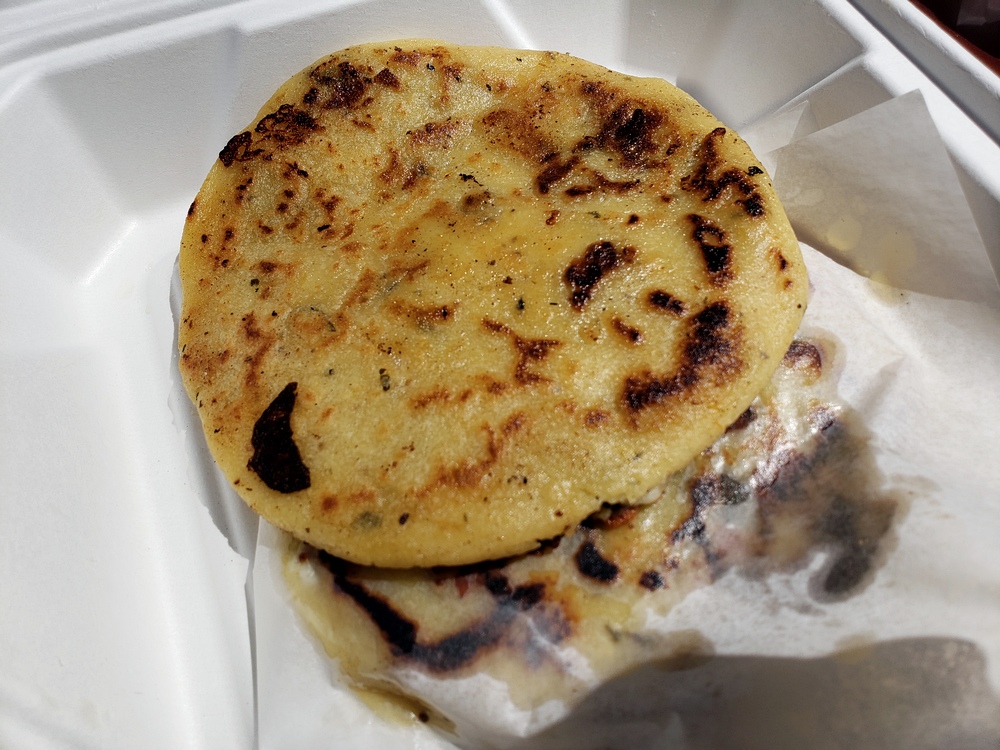“I'm definitely gonna get some people mad with this one,” jokes René Alesandro Coreas, creator and chef of L.A.’s Walking Spanish pop-up.
Coreas means the French-inspired escargot pupusas he brought to East L.A. this past Tuesday, another toehold in his quest to put out-of-the-box twists on Central American cuisine.
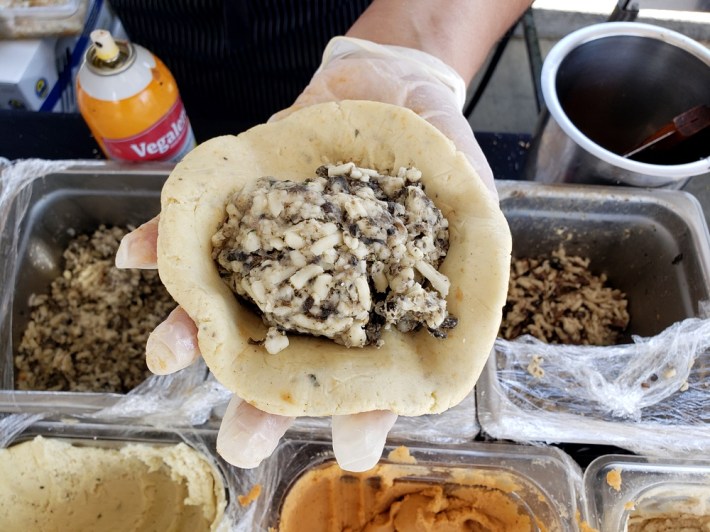
The buttery, plump pupusas take their form from the chef’s lemon-butter-infused masa; bowels near to bursting with an alloy of chopped snails, shallot-wine butter, and melty quesillo, with a small dab of goat cheese for salinity. Each hand-shaped handful of his housemade corn dough gets stuffed with this by the chef’s skilled digits, landing on the hot griddle to sizzle and sputter until ready to eat. They come out crisp on the bottom and delicately soft on top, where a sharp, slightly-spicy curtido will soon be scattered.
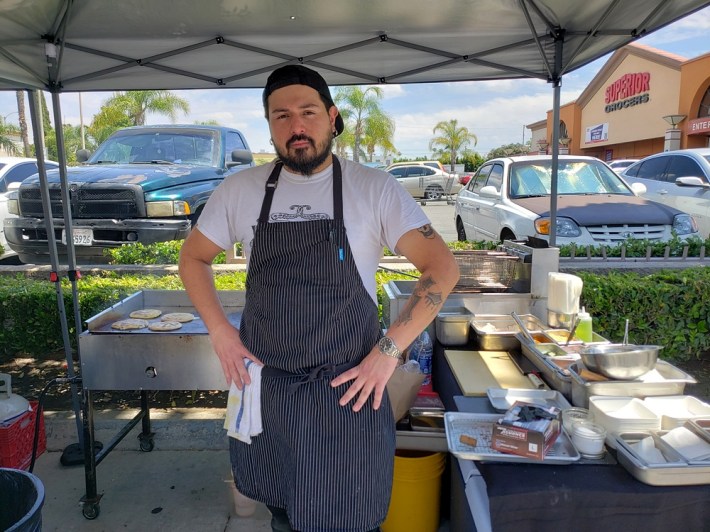
“I grew up, like, a very heavy metal, rock n’ roll kid,” Coreas tells TACO, a Misfits Fiend Club skull poking from his white sleeve.
“I kinda always liked people looking at you like you were weird. I wanted to do something that people were kinda going to be scared to try. But once they try it, they would open their mind and say, ‘hey maybe I should try other things that I thought were gross or disgusting before, but they’re just really tasty, y’know?’
Coreas is far from just an epicurean shock-artist. The escargot pupusas, named the Frances Limon, tell a personal story full of reflection on what ingredients mean to him and his L.A. hometown. Like he intends all of his food to do.
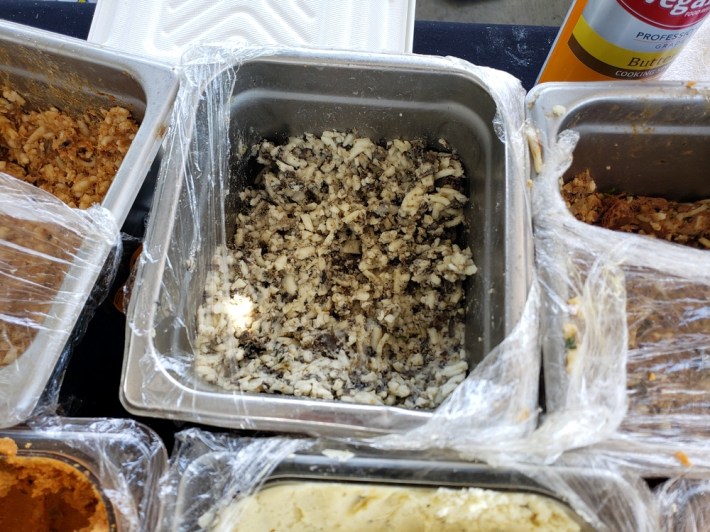
Coreas worked for over five years as a sous chef at Ludo Lefebvre’s Petit Trois. The escargot pupusa, as well as the garlic masa-based Champion with mushroom duxelles and herbs de Provence, combine Lefebvre’s teachings with Coreas’ love of French cuisine, together driving his mission to give greater exposure for the Salvadoran cooking he grew up on.
“I really wanted to do, like, the Frenchest pupusa you could think of,” he says. “What’s better for that than escargot? I wanted to do it in honor of everything I’ve learned from Ludo. It was definitely directly related to working at Petit and under him for a long, long time.”
Coreas’ own life journey inspires much of Walking Spanish’s food. A Korean-inspired pupusa named Shatto 39, which fills a scallion-sesame masa (essentially pa jun in masa form) with galbi-jjim, hearkens back to the hours he’d spend at the Koreatown arcade while his parents worked at the Sizzler across the street, where the couple also first met.
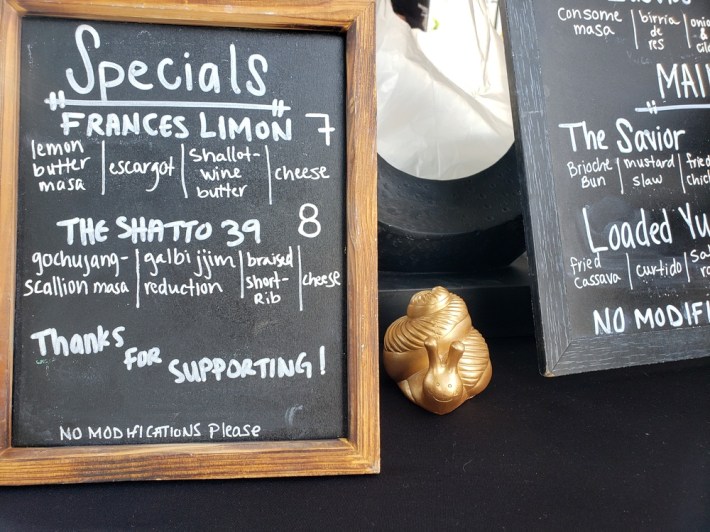
The first time L.A. TACO encountered Coreas, he was offering pupusas for pick-up and delivery from his own apartment via direct messaging. Since then, he’s been tweaking recipes and popping up between his intense restaurant hours, gaining greater confidence in his cooking and out-of-the-box dishes along the way.
His friends at the creative taqueria Evil Cooks inspired him to further embrace and amp up his vision of creating non-traditional Central American cuisine.
“One thing I’ve realized is that no one is really touching Central American food,” he says. “And if they are, they’re keeping it really traditional. So my sense of pride comes from being that person that’s there to break the rules. And it’s a little scary at first, but if I don’t do it then who will?”
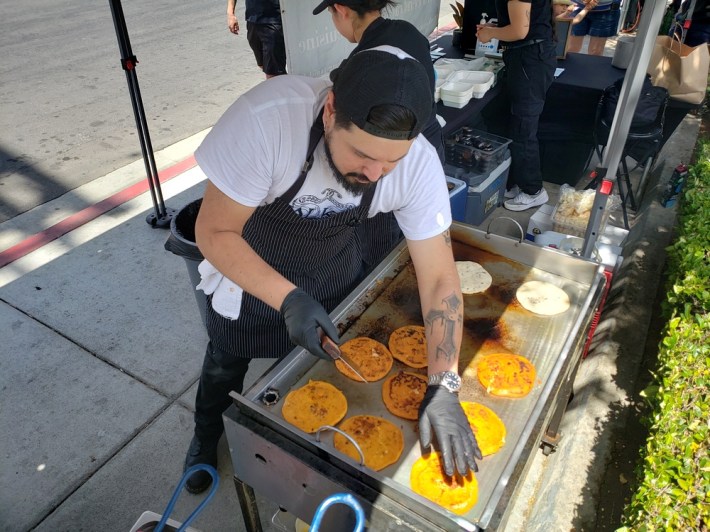
Naturally, Coreas has caught all kinds of condemnation since launching a pop-up intent on skewing Salvadoran recipes.
“I’ve had some bad reactions,” he explains. “People make faces and say ‘that’s not pan con pollo, that’s a burger. I’d never try that.’ Or, ‘you shouldn’t be putting that in a pupusa. That’s not Salvadoran.’”
“That kinda hurts, because I’m as Salvadorean as they come. I learned to make pupusas from my grandma and we make them that old-school way. Filling the masa, rolling it into a ball, and flattening them, which is kinda like a lost art. So we’re doing a lot of new, out-of-the-box stuff, but with the old techniques.”
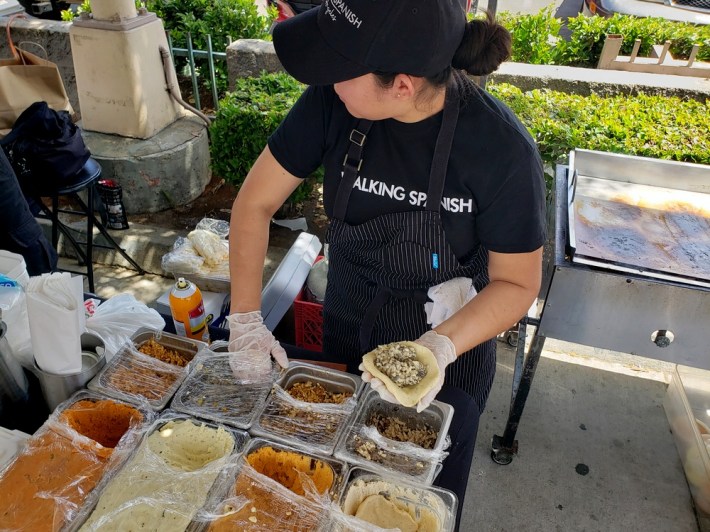
When posting up in East L.A. last year, a Salvadoran influencer shot some video for his social media.
“Half the people were saying the food’s not Salvadoran,” Coreas recalls. “The other half was saying ‘what are Salvadorans doing in East L.A.?’ It got pretty bad. I got a little scared, like maybe I shouldn’t pop back up here. It’s kind of sad. Especially in a time like right now, we should all be together, as opposed to pointing fingers at each other.”
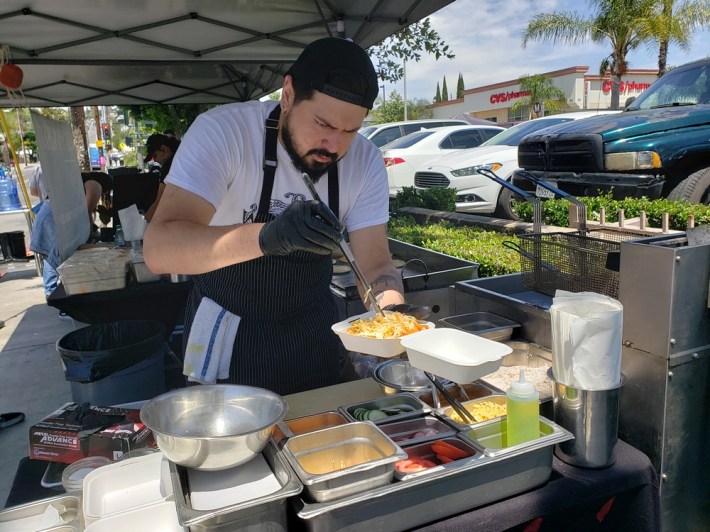
Correas believes a fear of criticism, or a potential lack of sales, is what ultimately nets L.A. endless birria de res stands and smashburger pop-ups. But the chef is devoted to breaking moulds himself, striving to unite L.A. flavors and people. He’s been reading a lot of Jonathan Gold lately, taking inspiration from the celebrated critic’s inclusive portraits of L.A.
“He showed a lot of love for the city,” Coreas says. “I really wanted to do something similar. Honoring Los Angeles, not just with words, but with flavors. Birria is very Mexican, galbi-jjim is Korean, pupusas are Salvadorean. The snails are French. I’m trying to combine everything to show unity and camaraderie, just in the food. Like, if these flavors go well together, why can’t we?”
As if to punctuate those words, a flyer stuck to an electric box across from his stand on Rowan Avenue advertises a long-past Staples Center concert featuring Snoop Dogg with Mazatlán’s Banda MS.
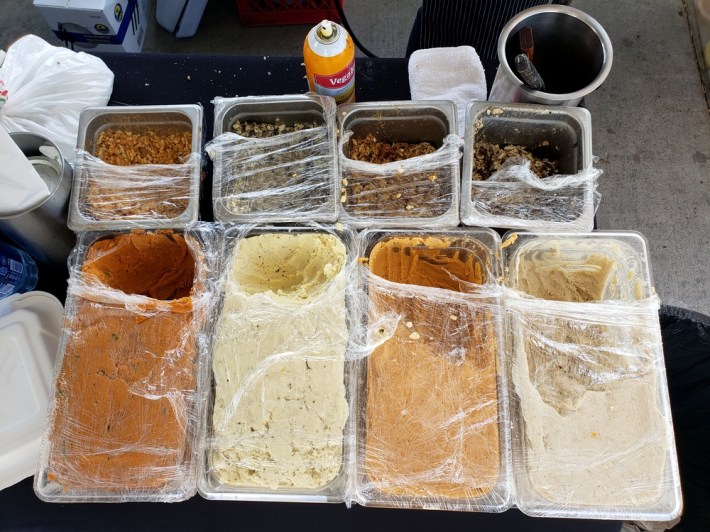
“There’s so much influence right next door to you,” Coreas says. “It’s a little foolish to not take advantage of that. Instead of being a skeptic or judgmental, we should open arms and invite influence in. Tradition will still be there if it’s in your heart. Doesn’t mean you can’t try something new. And I’m sure other people are going to do it, too.”
In some corners of the country, like-minded people already are. Coreas mentions the “progressive Salvadoran” Oakland restaurant Popoca, which prepares wood-fired pupusas. Author and food writer Karla T. Vasquez of SalviSoul has also detailed unconventional pupusas that buck the traditional. Many of us still long for Bell’s own departed Corazon y Miel, where chef Eddie Ruiz expanded local perceptions of Central American and Mexican food.
Despite skeptics and naysayers, Coreas plans to continue walking his chosen path.

He’s concocting plans to open his own upscale, wood-fired Central America concept, where he can present creations like a salsa de tomate-tossed ravioli with pupusa fillings (bean, cheese, and pork); Petit Trois-inspired salpicon tartare with mint and loroco on handmade tostadas; and sweet-and-savory, mole pipian-shelled frozen bananas that riff on the desserts his business partner and girlfriend, Stephanie Lemus, grew up eating in Guatemala.
He'd also like to open a small, casual family version of Walking Spanish, as well as a bar cranking out classic rock, metal, and “very crazy pupusas,” like the delicious K-Town spots we all love when drinking late into the night.
“I’ve slowly but surely begun dedicating my life to this,” he says.
In the meantime, follow Walking Spanish to find his next pop-up, where you never know what you may find in pupusa form. But will be well rewarded to go along and try it.

